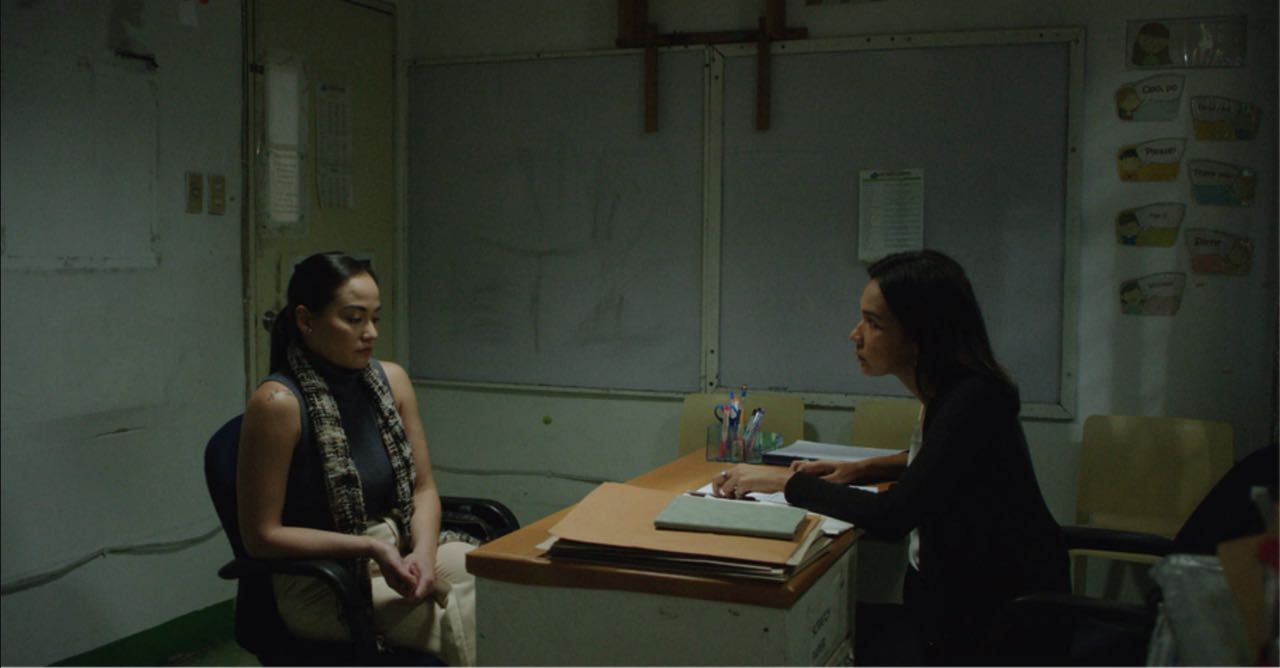
Anna Isabelle Matutina’s debut feature 12 Weeks is a hard-hitting examination of the daily struggles that Filipino women encounter in their deeply conservative and blatantly misogynistic homeland. The film’s story is told through the eyes of 40 year-old Alice (played with gusto by Max Eigenmann), who discovers she’s pregnant right after breaking up with her boyfriend. Viewers follow Aliceas she decides whether she wants, or is even ready, to become a mother.
Rooted in realism

Right away, Matutina roots 12 Weeks in realism. The film’s first scene shows Alice facing the camera while answering a succession of inquisitive questions—it’s so jarring that viewers may feel as if they’re being questioned themselves. Such stylistic choices hint at Matutina’s background as a director and editor for the award-winning Filipino documentary program I-Witness. 12 Weeks continues with its documentary style by using long and steady close-ups to highlight Alice’s suffocation and claustrophobia.
Matutina relies heavily on Eigenmann to show a variety of emotions—whether frustration, anger, or despair. Eigenmann gladly accepts this challenge and does so with gripping rawness. Furthermore, Matutina cast Eigenmann’s real mother Bing Pimental to play Alice’s mother in the film. This gives the two characters a sense of perfect chemistry, especially in scenes where they bicker. It also helps that 12 Weeks draws heavily from Matutina’s own experiences—she wrote the film as she was turning 40, and struggling with the likelihood of not bearing children.
Perhaps the only questionable aspect of 12 Weeks is Matutina’s choice to set the film amidst the Marawi Siege, with Alice working in an NGO to help evacuees. If viewers connect the dots enough, perhaps the Siege helps highlight instances of patriarchy, for instance when Alice mentions that military commanders might react better when speaking to her male colleagues. But oftentimes, the events of the Siege feel disconnected from the rest of the film, with Matutina grasping at straws when it comes to Alice being barely able to help herself even if her job is all about helping others.
My body, my choice

At one point in the film, Alice’s mother casually mentions that she thought of aborting Alice. Such jarring statements are just something that Alice—and women in general—have to face. Alice barely cracks a smile at this statement; she has too much to deal with on a regular basis.
Matutina also highlights the discordance between Alice’s reality and others’ unreasonable expectations. Alice exhibits child-like tendencies, and clearly isn’t ready to become a mother—yet those around her keep dictating her choices. Her good-for-nothing boyfriend wants to keep the baby yet can’t make ends meet, her mother wants to be a grandmother, and even the doctor keeps asking personal questions to change her mind. Alice’s life, and body, are not really hers.
All this reflects how the Philippines is still a deeply conservative and family-oriented society. A film like 12 Weeks which openly talks about abortion is already bold in this Catholic-majority country, where abortion has been illegal for over a century. The Philippines is also the only other country besides Vatican City to ban divorce, and many contraceptives weren’t legal until recently either. And while a Reproductive Health Law was implemented in the past decade, there’s still strong opposition from the Catholic Church towards it, and the implementation of family planning policies.
All this results in many unwanted or surprise pregnancies, much like Alice’s. In fact, the Philippines ranks 56th among 150 countries for the number of unintended pregnancies—with many of these pregnancies not something women have full agency over. Amidst this landscape, 12 Weeks is significant because it opens a conversation about women’s rights, and their ability to make choices about their lives and bodies.
In a sense, viewers can be forgiving of Matutina’s attempt to show that a woman’s choice extends beyond her body. A woman’s choice can get blocked in daily conversations or by misogynistic beliefs, values, or customs. Women, like Alice, can choose defiance—but with consequences. 12 Weeks might be bleak, but it ends with many questions to ponder around whether women are truly free from patriarchy’s shackles.
• • •
12 Weeks (Tagalog: Labing Dalawang Linggo)—Philippines. Dialog in Tagalog and English. Directed by Anna Isabelle Matutina. First released August 22, 2022 at the Cinemalaya Film Festival. Running time 1hr 45 mins. Starring Max Eigenmann, Bing Pimentel, Vance Larena, Claudia Enriquez.
This article is part of Cinema Escapist’s dedicated coverage of the 2023 New York Asian Film Festival.
